What is the Green Climate Fund?
The Green Climate Fund (GCF) is the largest global climate fund. It was established in 2010 as a financial mechanism of the United Nations Framework Convention on Climate Change (UNFCCC) to support the efforts of developing countries to respond to the challenge of climate change.
The main goal of the GCF is to help developing countries limit or reduce their greenhouse gas (GHG) emissions and adapt to climate change, and to promote a paradigm shift to low-emission and climate-resilient development. The GCF has the important role of serving the Paris Agreement and supporting the goal of keeping climate change well below 2 degrees Celsius above pre-industrial levels and pursuing efforts to limit the temperature increase to 1.5 degrees Celsius above pre-industrial levels.
The architecture of the GCF and its activities are aligned with the priorities of developing countries through the principle of country ownership – fundamentally grounded through each country’s National Designated Authority (NDA). The NDA is the fundamental intermediary and point of communication between a country and the Fund, responsible for ensuring activities proposed for support by the Fund align with strategic national objectives and priorities.
One of the distinct and differentiating features of the Fund is its direct access modality that was established to allow national and sub-national organizations to receive funding directly, rather than only via intermediaries. This modality supports the cornerstone of the Fund’s operation – country ‘drivenness’ and ownership – and was designed to help developing countries exercise ownership over climate finance.
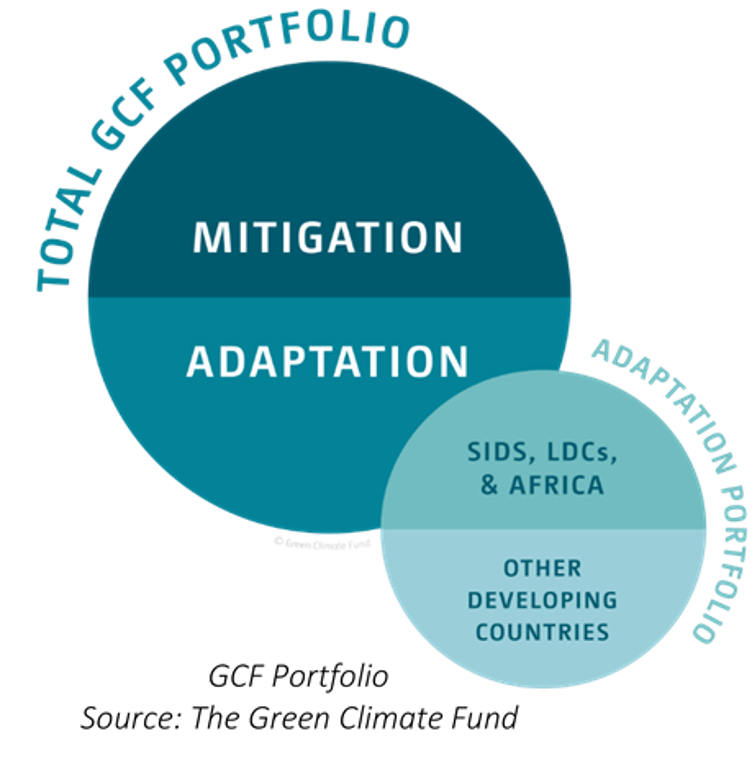
Further institutions are necessary for this Policy’s implementation. In order to separate water services provision from water resources management, a new entity is proposed to carry out the day to day management of Grenada’s water resources in their entirety. It is also proposed that the Public Utilities Regulatory Commission (established by the Public Utilities Regulatory Commission Act, 2016) will provide policy level and administrative oversight of the proposed Water Resources Management Unit (WRMU), water and wastewater services regulation.
Over the past few years, Grenada has developed several national policy documents and plans, the following of which have direct relevance for the water sector.
To date, the fund has secured more than USD 10 billion in pledges and continues to mobilise resources on an ongoing basis to ensure that the Fund has resources to support projects and programmes in its funding proposal pipeline. While the Fund is mandated, as outlined above, to aim for the stated balances and allocations, projects and programmes are approved by the GCF Board on a rolling basis, dictating a first come, first served basis. For a country to be successful in accessing resources, it is therefore essential for the NDA to have adequate capacity to carry out its functions and to also be proactive in their engagement with the Fund.
The GCF finances projects and programmes that are in line with its Results Management Framework (RMF). The RMF defines eight strategic impacts to be achieved at the fund level – four of which are mitigation focused and four adaptation focused. When developing a project or programme, one or several of these impact areas can apply.
The GCF actively promotes synergies across areas of adaptation and mitigation and promotes environmental, social, economic and development co-benefits. It also strongly supports projects and programmes with a gender-sensitive and gender-responsive approach. If persons believe these projects will have adverse impacts, complaints are assessed by the Independent Redress Mechanism.
The GCF has established six criteria in its Investment Framework to guide the manner in which it takes decisions on its investments.
- Impact Potential
- Paradigm Shift Potential
- Sustainable Development Potential
- Country Ownership
- Efficiency and Effectiveness
- Needs of the Recipient
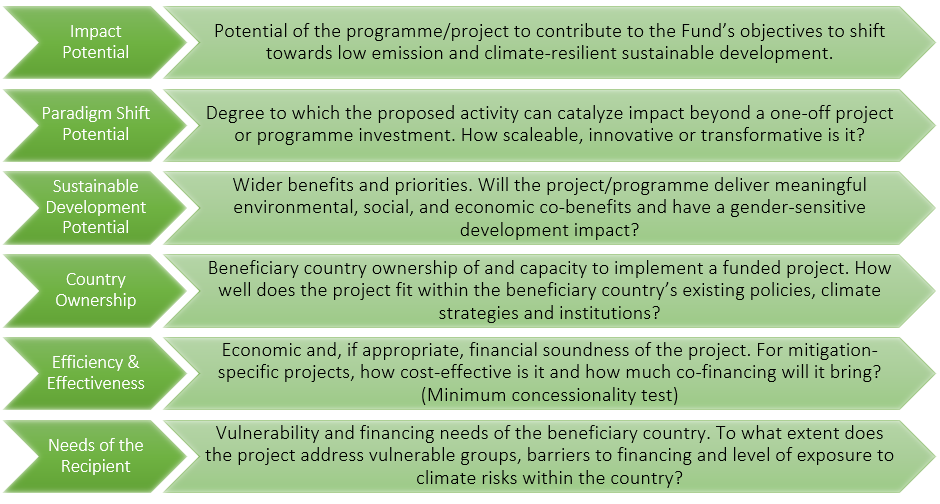
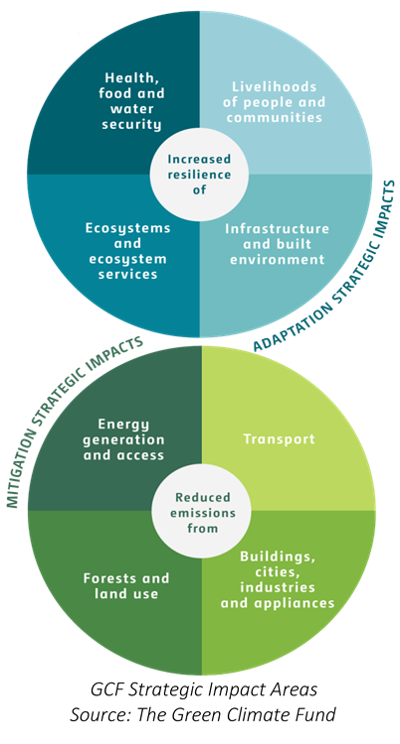
The Fund’s investments can be in the form of grants, loans, equity or guarantees. This enables the Fund to match the project needs and adapt to specific investment contexts, including using its funding to overcome market barriers for private finance. The ultimate goal of each of the instruments is to mitigate the project or programme risks and create more favorable conditions, thereby unlocking the prospect for leveraging of additional financing.
Find out how to access the GCF’s resources below.
To view the Green Climate Fund Country Page for Grenada, click here.
How to Access Resources
To channel the resources of the Green Climate Fund to projects and programmes, the Fund works through Accredited Entities.
Accredited Entities carry out a range of activities that usually include the development of funding proposals and the management and monitoring of projects and programmes. Countries may access GCF resources through multiple entities simultaneously. Accredited entities may carry out a range of activities, however their most important and main function is to develop project and programme proposals and manage and monitor those projects and programmes that have been approved.
These entities have different characteristics and can be private or public, non-governmental, sub-national, national, regional or international, as long as they meet the standards of the Fund. Each institution is required to have policies and procedures in place that are aligned and consistent with the GCF’s fiduciary standards, environmental and social risks and gender policy.
The types of Accredited Entities are:
Direct Access Entities (DAE)
Direct Access Entities are sub-national, national or regional organizations are nominated by developing country National Designated Authorities (NDAs) or focal points directly receive GCF resources. Organizations nominated to become Direct Access Entities may be eligible to receive GCF readiness support. This funding is designed to help organizations in developing countries prepare to become Accredited Entities, as well as helping those which have already been accredited to strengthen their organizational capacities. Direct access entities include the likes of the Caribbean Community Climate Change Centre and the Caribbean Development Bank.
An improved form of Direct Access is Enhanced Direct Access (EDA) whereby responsibilities have been devolved to the national level, increasing ownership and allowing for decision-making and management on specific projects/programmes to be made at the country or entity level. Acquiring Enhanced Direct Access requires broader institutional capacities of the NDA and of the funding entities within the developing country.
International Access Entities (IAE)
International Access Entities (IAE) can include United Nations agencies, multilateral development banks, international financial institutions and regional institutions. The Fund considers these organizations to have the wide reach and expertise to handle a variety of climate change issues, including ones that cross borders and thematic areas. International Access Entities do not need to be nominated by developing country NDAs / focal points. There are benefits to working with international access entities, for example the access to larger and higher risk projects, however it is essential for the NDA to ensure that all projects and programmes are country driven and go through stakeholder consultation and nationally mandated procedures.
A list of accredited entities relevant to Grenada are included below.
| Agence Française de Développement (AFD) | International | Large | Basic/Project Management/Grant Award/On-Lending or Blending/Loans/Equity/Guarantees/Blending | Category A | France | Ms. Audrey Rojkof: rojkoffa@afd.fr | |
| Caribbean Community Climate Change Centre (CCCCC) | Regional | Small | Basic/Project Management/Grant Award/ | Category B | Belize | Dr. Mark Bynoe: mbynoe@caribbeanclimate.bz | |
| Caribbean Development Bank (CDB) | Regional | Small | Basic/Project Management/Grant Award/On-Lending or Blending/Loans/Equity | Category A | Barbados | Ms. Cheryl A. Dixon: dixonc@caribank.org | |
| Conservation International Foundation (CI) | International | Medium | Basic/Project Management/Grant Award | Category B | USA | Mr. Kurt Lonsway: klonsway@conservation.org | |
| Credit Agricole Corporate and Investment Bank (CIB) | International | Large | Basic/Project Management/Grant Award/On-Lending or Blending/Loans/Equity/Guarantees | Category A | France | Mr. Pierre Bauchere: pierre.bauchere@ca-cb.com | |
| Deutsche Bank Aktiengesellschaft (DB) | International | Medium | Basic/Project Management/Grant Award | Category B | Germany | Mr. Michael Holter: michael.hoelter@db.com | |
| Deutsche Gesellschaft fur Internationale Zusammenarbeit (GIZ) | International | Medium | Basic/Project Management/Grant Award | Category B | Germany | Jochen Quinten: jochen.quinten@giz.de | |
| European Bank for Reconstruction and Development (EBRD) | International | Large | Basic/Project Management/Grant Award/On-Lending or Blending/Loans/Equity/Guarantees | Category A | UK | Mr. Ryan Alexander: alexandr@erbd.com | |
| European Investment Bank (EIB) | International | Large | Basic/Project Management/Grant Award/On-Lending or Blending/Loans/Equity/Guarantees | Category A | Luxembourg | Ms. Kristina Eisele: k.eisele@eib.org | |
| Food and Agriculture Organization (FAO) | International | Medium | Basic/Project Management | Category B | Italy | Mr. Daniel Gustafson: GCF-Coordination-Unit@fao.org | |
| Grenada Development Bank | National | Grenada | |||||
| HSBC Holdings plc. (HSBC) | International | Large | Basic/Project Management/On-Lending or Blending/Loans/Equity/Guarantees | Category A | UK | Ms. Bonnie Chin: bonniechin@hsbc.com.hk | |
| Inter-American Development Bank (IDB) | International | Large | Basic/Project Management/Grant Award/On-Lending or Blending/Loans/Equity/Guarantees | Category A | USA | Mr. Matias Bendersky: mbendersky@iadb.org | |
| International Bank for Reconstruction and Development and International Development Association (World Bank) | International | Large | Basic/Project Management/Grant Award/On-Lending or Blending/Loans/Guarantees | Category A | USA | Ms. Claudia Croce: ccrose@worldbank.org | |
| International Finance Corporation (IFC) | International | Large | Basic/Project Management/Grant Award/On-Lending or Blending/Loans/Equity/Guarantees | Category A | USA | Ms. Kruskaia Sierra-Escalante: Ksierraescalante@ifc.org | |
| International Fund for Agricultural Development (IFAD) | International | Medium | Basic/Project Management/Grant Award/On-Lending or Blending/Loans | Category B | Italy | Ms. Magarita Astralaga: m.astralaga@ifad.org | |
| International Union for Conservation of Nature (IUCN) | International | Medium | Basic/Project Management/Grant Award/On-Lending or Blending/Loans/Equity | Category B | Switzerland | Ms. Sheila Aggarwal-Khan: Sheila.aggarwal-khan@iucn.org | |
| Japan International Cooperation Agency (JICA) | International | Large | Basic/Project Management/Grant Award/On-Lending or Blending/Blending | Category A | Japan | Mr. Kotaro Taniguchi: GCF_JICA@jica.go.jp | |
| Kreditanstalt für Wiederaufbau (KfW) | International | Large | Basic/Project Management/Grant Award/On-Lending or Blending/Loans/Guarantees | Category A | Germany | Mr. Matthias Borner: matthias.boerner@kfw.de | |
| Nederlandse Financierings-Maatschappij voor Ontwikkelingslanden N.V. PT Sarana Multi Infrastruktur (FMO) | International | Large | Basic/Project Management/Grant Award/On-Lending or Blending/Loans/Equity/Guarantees | Category A | Netherlands | Mr. David Kuijper: d.kuijper@fmo.nl | |
| Société de Promotion et de Participation pour la Coopération Economique (PROPARCO) | International | Large | Basic/Project Management/Grant Award/On-Lending or Blending/Loans/Equity/Guarantees | Category A | France | Ms. Camille Severac: severacc@proparco.fr | |
| United Nations Development Programme (UNDP) | International | Medium | Basic/Project Management | Category B | USA | Ms. Adriana Dinu: adriana.dinu@undp.org | |
| United Nations Environment Programme (UNEP) | International | Small | Basic/Project Management | Category B | Kenya | Ms. Ermira Fida: ermira.fida@unep.org or unevonivornment-gcf@un.org | |
| World Food Programme (WFP) | International | Micro | Basic/Project Management | Category C | Italy | Mr. Gernot Laganda: gernot.laganda@wfp.org | |
| World Meteorological Organization (WMO) | International | Small | Basic/Project Management | Category C | Switzerland | Mr. Markus Repnik: mrepnik@wmo.int | |
| World Wildlife Fund, Inc. (WWF) | International | Basic/Project Management/Grant Award | Category A | USA | David McCauley: WWFGCF@wwfus.org |
Learn how to become accredited below
For a full list of accredited entities for the GCF, click here
Getting Accredited
Accredited Entities are accredited by the Green Climate Fund (GCF) Board during regularly scheduled Board meetings. Accreditation applications are received by the Secretariat on a rolling basis i.e. there are no established deadlines, however decisions on the accreditation of new entities are only taken at meeting of the Board.
Accreditation Application Requirements
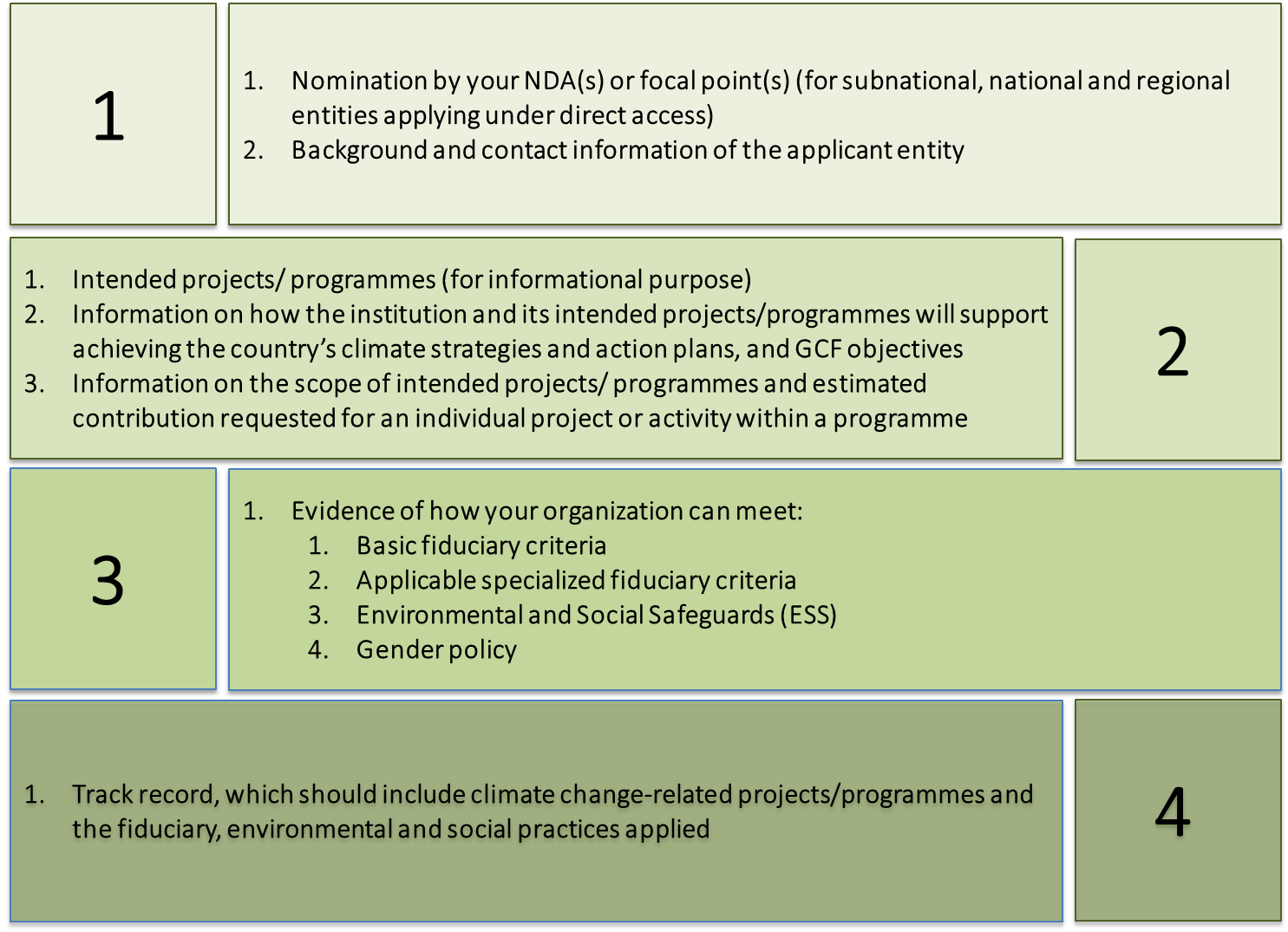
Specifications in the Accreditation Process
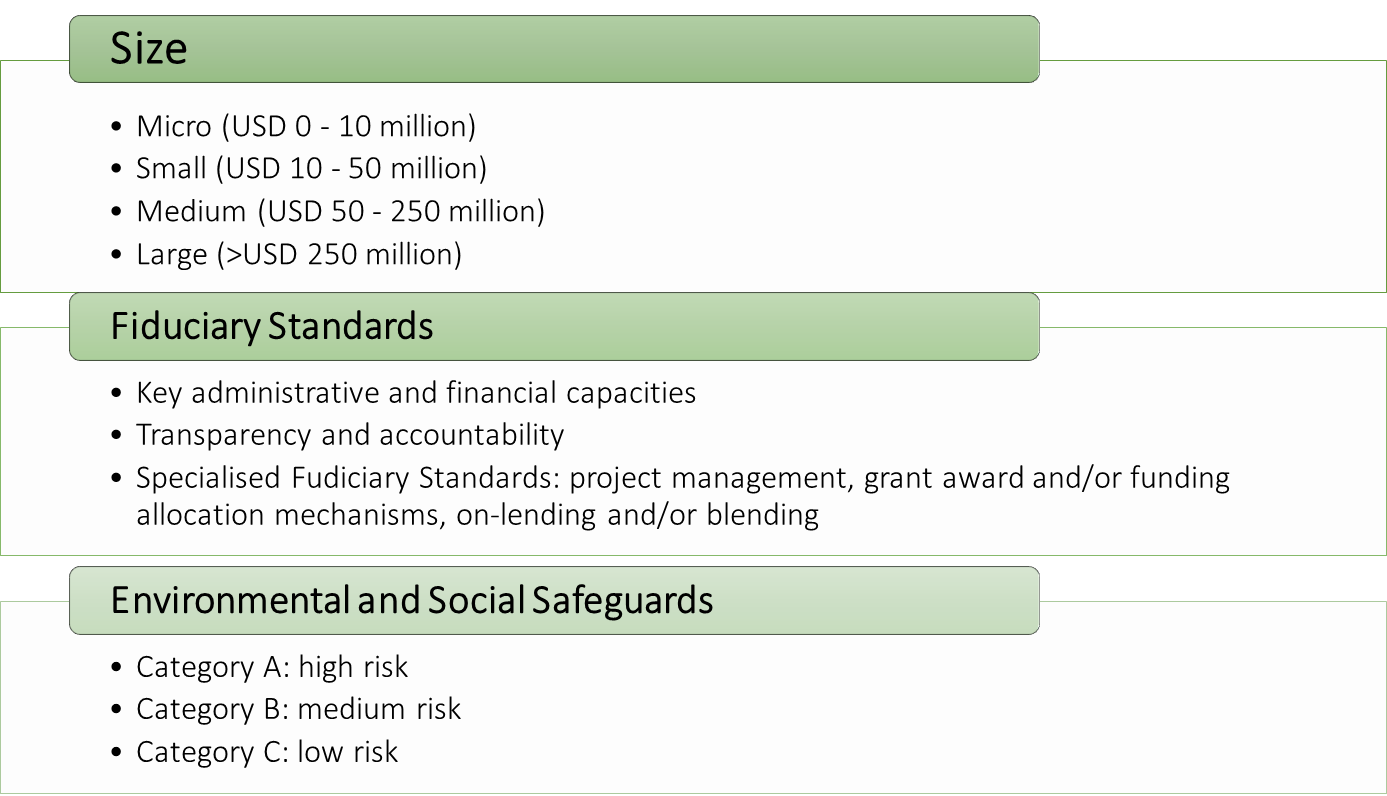
The GCF estimates that on average the accreditation process takes at least 6 months from submission of the application to a Board decision, if there has not been a request for readiness support and there are no clarifications required. If a request for accreditation support though the Readiness Programme has been submitted and there are numerous clarifications by the Secretariat and the Board, the accreditation process may take up to two years.
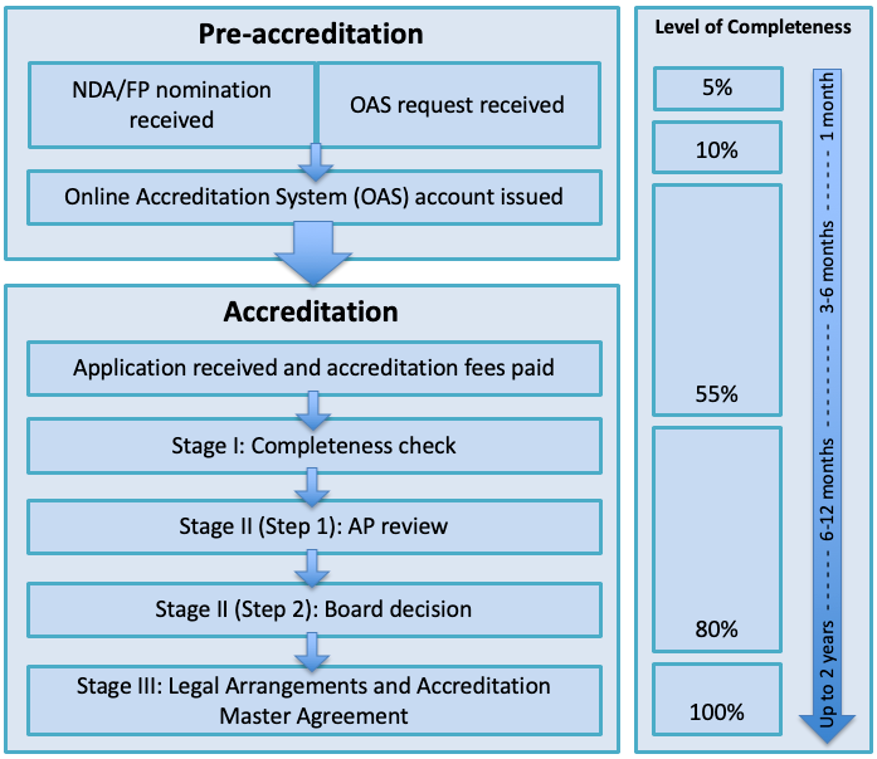
Accredited Entities
Ensuring Country Ownership of Projects
As per GCF operational guidelines, a letter of no-objection from the NDA is required to accompany the submission of a proposal to the GCF for funding. The no-objection, in the form of a letter is required for projects submitted by any entity including national and multilateral and private, for the Secretariat to even start processing a proposal.
The purpose of the no-objection procedure is to ensure that concept notes and project or programme proposals that are being put forward to the GCF have genuine country ownership and stakeholder buy-in and that those proposals are contributing to achieving national climate targets, strategies, priorities and plans.
There are three occasions in which a No-Objection may be requested from the NDA:
- No-objection is required for Concept Notes when an application is submitted to the Project Preparation Facility (PPF). The GCF guidance specifies that PPF applications should be made by the Accredited Entity after consultation with the relevant NDA. A no-objection letter for the PPF request should be included in the PPF application.
- A no-objection is optional for Concept Notes of full funding proposals that are submitted to the GCF Secretariat for feedback. While a no-objection is not required for Concept Notes of full funding proposals that are submitted to the GCF Secretariat for feedback, the Accredited Entity must inform the NDA about its submission of a concept note to GCF and therefore engagement with the NDA is crucial.
- A no-objection is required for all funding proposals.
The no-objection procedure results in a project proposal no-objection letter signed by the official signatory of the NDA registered with the GCF Secretariat and should be provided to the GCF Secretariat in conjunction with any submission of a proposal seeking funding from the Fund. This official representative can be found on Grenada’s county profile on the GCF website, including for accredited entities that wish to start a discussion on a project.
A meaningful and genuine no-objection procedure is fundamental in ensuring and promoting ownership and a country-driven approach, the cornerstone of the Fund. The importance of country ownership and country drivenness is outlined in the Fund’s Decision GCF/B.17/14 - Guidelines for Enhanced Country Ownership and Country Drivenness.
In the case of applications for accreditation by subnational, national and regional implementing entities and intermediaries, the NDA or focal point will facilitate the communication of applications of implementing entities and intermediaries for accreditation to the Fund. An accreditation no-objection letter for proposing new Accredited Entities to the Fund is required and the NDA is thereby certifying that the applicant entity is a recognized entity with the government.
In cases of submissions of proposals for funding involving Grenada that are not accompanied by a letter of no-objection, the Secretariat will inform the NDA and that the funding proposal will not be processed unless the NDA provides its no-objection. The NDA shall then provide its no-objection within 30 days after receiving this information. If the NDA does not provide the no-objection letter within the 30 days, the proposal will be suspended and the Secretariat will notify the Accredited Entity or intermediary.
For more information, go to ‘Grenada’s National Designated Authority’s Toolkit for Engaging with the Green Climate Fund’, found in the Document Library under Tools and Resources.
Developing Readiness and Project Proposals
The Green Climate Fund provides several avenues for accessing funds for the development of various proposals.
Readiness & Preparatory Support Programme
As ‘country drivenness’ is the cornerstone of the Fund’s work, the Fund provides support to build institutional capacities of the country’s Nationally Designated Authority and Direct Access Entities to access funds and maximize their strategic engagement with the Fund. Building the ‘Readiness’ of a country to access GCF resources should be done on an ongoing basis and part of an iterative process to strengthen a country’s engagement with the Fund.
Through this Readiness Support Programme the Fund aims to enhance country ownership through five main outcomes:
- Strengthening country capacity;
- Engaging stakeholders in consultative processes;
- Supporting the accreditation of direct access entities;
- Providing access to finance; and
- Mobilizing the private sector.
Strengthening the capacity of the NDA to access GCF resources through the above outcomes is capped at USD $1 million per country per calendar year. Of this amount, the NDA may request up to USD $300,000 per year to help establish or strengthen the NDA to deliver on the GCF’s requirements. In addition to the above amounts, the Fund’s Readiness Programme provides up to USD $3 million per country to support the development of National Adaptation Plans/other adaptation processes.
Grenada is benefitting from this Readiness Programme through the implementation of the following projects:
- Getting Grenada GCF Ready (3G)
- Strengthening Institutional and Implementation Capacity for Delivery of Climate Change Investment Projects: Grenada
- Climate Resilient Cities: Grenada
Project Preparation Facility
The Project Preparation Facility (PPF) provides support to take concept notes and develop them into full funding proposals. These requests are developed by Accredited Entities and approved by the Fund’s Board based on the Fund’s investment criteria and the justification of the need for support for project preparation. The support from the PPF is usually in the forms of grants and are capped at USD $1.5 million per project but not to exceed 10% of total project/programme costs for GCF to finance.
The following activities are supported by the PPF:
- Pre-feasibility and feasibility studies and project design;
- Environmental, social and gender studies;
- Risk assessments;
- Identifying programme- and project-level indicators;
- Pre-contract services including revision of tender documents;
- Advisory services and/or other services to financially structure a proposed activity; and
- Other project preparation activities, where necessary.
To apply to the PPF, the AE must have a letter of no-objection signed by the NDA, which will ensure that the project or programme is aligned with national priorities and has full country ownership. The full funding proposal developed through the PPF should be submitted to the GCF Board for approval within two years of the approval of the PPF request.
For more information on PPF, click here for the Fund’s guidelines.
For more information on the no-objection procedure for the GCF, click here.
The Simplified Approval Process (SAP)
The SAP intends to reduce the time and effort needed in the preparation, review, approval and disbursement procedures for proposals of certain activities, in particular small-scale activities. The documentation to be provided is reduced while the review and approval processes are streamlined.
The SAP has three main eligibility criteria including a SAP concept note template with an ESS checklist, is available on the Fund’s website.
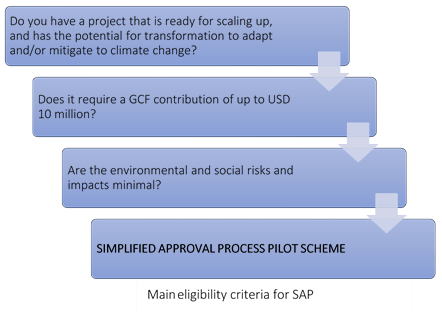
The GCF has prepared a manual for preparing SAP proposals along with a SAP Concept Note and SAP Funding Proposal template.
Concept Notes
Project proponents, such as the NDA or the Accredited Entity, may submit on a voluntary basis, a concept note for feedback and recommendations from the GCF Secretariat in coordination and consultation with the NDA. The purpose of submitting concept notes is to provide the Accredited Entity an opportunity to seek feedback and guidance to allow for strengthening and further development of the project/programme idea. This will support the lead into the next step of the process of developing and submitting the full proposal for funding.
The concept note may be submitted by the AE or the NDA and while it is not a mandatory step in the process, it is strongly encouraged to ensure feedback from the GCF Secretariat that will allow for early strengthening of a project/programme proposal and will facilitate a faster review process.
The GCF concept note user guide and template are both available in the Document Library.
Projects and Programmes
The final stage of accessing resources from the GCF is the provision of financing to climate resilient and low-emission projects/programmes that contribute to the achievement of at least one of the Fund’s strategic areas.
The funding proposal must align with the Fund’s priorities and policies as approved by the Board and expressed in a series of key policy documents that constitute guard rails for developing successful projects and proposals:
Results Management Framework (RMF)
The Results Management Framework (RMF) of the Fund monitors the GCF’s results at the project, programme and aggregate portfolio levels. It includes indicators that measure progress toward intended results based on objectives, impacts and outcomes defined in logical framework, which will be used as the basis for the monitoring, reporting and evaluation of the Fund’s progress over time. The activities required by the RMF should be country driven and determined through a consultative process with key stakeholders.

Gender
The GCF seeks to ensure gender is integrated in all aspects of its processes and operations with the implementation of gender sensitive interventions at all levels. The gender principle ensures that GCF funded projects adhere to gender equality and equity, as per international agreements and other human rights agreements.
Under the Gender Policy and Action Plan 2019–2021, the GCF requires the NDA to take the necessary measures to ensure that proposed projects, as well as proposed activities under the GCF Readiness and Preparatory Support Programme, submitted to GCF for financing are aligned with national policies and priorities on gender.
To support NDAs and AEs in the task of mainstreaming gender, a guide has been published by the GCF and UN Women.
Environmental and Social Safeguards
The GCF is mandated to effectively and equitably manage environmental and social risks and impacts, and improve outcomes of all GCF-financed activities. Based on the Fund’s Environmental and Social Policy, the Fund will require that all GCF-supported activities will commit to:
- Avoid, and where avoidance is impossible, mitigate adverse impacts to people and the environment
- Enhance equitable access to development benefits; and
- Give due consideration to vulnerable populations, groups, and individuals.
Applications for funding are submitted through accredited entities with the endorsement of the NDA via the Letter of No-Objection.
For more information, go to ‘Grenada’s National Designated Authority’s Toolkit for Engaging with the Green Climate Fund’, found in the Document Library under Tools and Resources.
